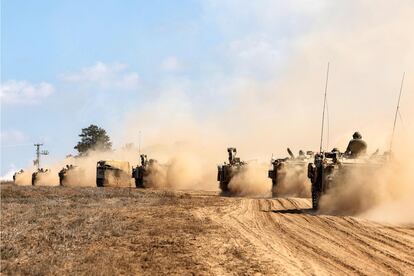Hamas war turns Israel’s bustling hubs into ghost cities
Activity has plummeted as a result of the attack, with many fearing to go out despite the heavy police presence


The face of Israel has changed due to the state of war following the attack launched last Saturday by Hamas on the outskirts of the Gaza Strip. With more than 1,300 dead, the vast majority of them Jews, it is being described as the most tragic attack since the Holocaust. The usually bustling streets of Jerusalem, Tel Aviv and Haifa —densely populated areas — appear deserted, evoking the desolate landscape of the first weeks of the Covid-19 pandemic in 2020. With schools, factories, offices and businesses closed, commercial activity has collapsed in vibrant spots as Jaffa Street in Jerusalem, which still retains the colonial charm of the era of the British mandate over Palestine (between 1922 and 1948).
“What we make each day has dropped by more than 50%, my wife has asked for unpaid leave to take care of our three children at home and at 5:00 p.m. there is no longer a soul left in this area. Usually, we open at 6:00 a.m. and close at midnight,” says Lazard Garmish, 40, at the bar of the Coffee Cake cafeteria, at the entrance to the Russian Quarter from the same street in Jaffa. “I still open because we are next to the central police station, otherwise it wouldn’t be worth it,” he adds. He is resigning himself, like many other self-employed businesspeople, to suffering the economic consequences of the war against Hamas. “Before we served about 3,000 coffees a day, now we hardly make 500.”
The tram runs from time to time in Jerusalem, but city buses from the western part of the Holy City no longer travel through the streets, which have been taken over by police vehicles, motorcycles from the anti-terrorist unit and patrols of the militarized border police. In the eastern part of the city, the transportation system for the Palestinian population remains partially operational, while its inhabitants seem to have disappeared amid the prevailing tension. The young pharmacist Fatima, who prefers not to reveal her last name, works with a hijab at the chain Superpharm. “They bring me here by car from my house in East Jerusalem, and then they come to pick me up,” she explains reservedly. “It’s better not to walk through the empty streets.” The police deployment has also reinforced by Jewish Israeli civilians who visibly carry pistols, and even M-16 assault rifles.

Trains seem to running as usual, although their main occupants are now the more than 350,000 reservists who have been called up in what is shaping up to be the largest mobilization since the Yom Kippur War, which took place 50 years ago. On the journey between Jerusalem’s Isaac Navon station and Savidor station in central Tel Aviv on Tuesday, most of the passengers were in military uniforms. Almost all of them were between 30 and 40 years old. They traveled with an air of poise and indifference, compared to the recruits aged between 18 and 21, who were nervously preparing for their first large-scale armed conflict. In the Tel Aviv metropolitan area, the train occasionally stopped or moved slowly as rocket alerts blared on cell phones.
While used to emergency situations, Israelis are now experiencing one of the tensest moments in at least a decade, since Operation Protective Edge, the 2014 war between the Israeli army and militants in the Gaza Strip. That conflict lasted for more than two months and killed 2,300 Palestinians, mostly civilians, and 73 Israelis, nearly all soldiers. In the first six days of the current conflict, both sides have already registered more than 1,300 fatalities.
The high tension is leading to false alarms. When surveillance radars detected the alleged infiltration of a dozen paragliders into Israeli airspace from the north, an alert was launched for all towns located next to the Lebanese border. That was the official explanation. After verifying that there was no threat, General Rafi Milo ordered the alarm to be lifted. But there was a misunderstanding and a soldier pressed the national alert button, so that the entire population of Israel rushed to air raid shelters.
Highway 2, running along the coast from Tel Aviv to Haifa, is dotted with checkpoints where occupants of Arab-looking vehicles were systematically identified. The deep emotional shock left by last Saturday’s Hamas attack is palpable in the atmosphere on the streets. Only a few people over 60 or 70 can recall a similar situation of tension and fear in Israel, which has been deeply traumatized.
In Jerusalem, air raid alarms sounded on Monday afternoon. Most of the rockets were intercepted by Israel’s Iron Dome missile defense system, although others caused seven injuries, three of them seriously, when they hit the outskirts of the Holy City. So far, only one Palestinian protest has been recorded in Jerusalem in the Silwan district of East Jerusalem, where groups of young people threw stones and fireworks. In the clashes, two Palestinians were shot dead by Israeli security forces, according to Spanish news agency EFE. A Palestinian also opened fire on Thursday night against Israeli officers at a police station in Jerusalem, according to EFE. Two police officers were injured, and the assailant was killed.
Not all Jerusalem merchants take a dim view of the outbreak of the war. At the Sol chain supermarket on Rabbi Kook Street, in the center of Jerusalem, José Huspa, 65, boasted about business. The manager of the establishment, a Mexican Jew who immigrated to Israel in 1988, said that his daily earnings had doubled. “People have gone crazy, and are hoarding food as if it were the end of the world,” he said. “But supplies are arriving regularly and all the shelves are full,” he added, while four Palestinian employees from Jerusalem worked to restock the shelves. “Am I afraid? Who cares about war? Not having a job would be worse,” said one of them, who preferred not to give his name.
Four out of five Israelis consider that the government of Benjamin Netanyahu is responsible for the offensive carried out by Hamas, according to a survey by the Dialogue Center. Some 86% percent of Israelis —and 79% of supporters of the most conservative government coalition in the country’s history — believe that the incursion of the Palestinian armed group represents a “failure” for the government. And 94% think that the Israeli government is responsible given the “lack of preparation” in terms of security, according to the study, which was published by the newspaper Jerusalem Post. More than half of those surveyed (56%) believe that Netanyahu should resign once the war is over.
Sign up for our weekly newsletter to get more English-language news coverage from EL PAÍS USA Edition
Tu suscripción se está usando en otro dispositivo
¿Quieres añadir otro usuario a tu suscripción?
Si continúas leyendo en este dispositivo, no se podrá leer en el otro.
FlechaTu suscripción se está usando en otro dispositivo y solo puedes acceder a EL PAÍS desde un dispositivo a la vez.
Si quieres compartir tu cuenta, cambia tu suscripción a la modalidad Premium, así podrás añadir otro usuario. Cada uno accederá con su propia cuenta de email, lo que os permitirá personalizar vuestra experiencia en EL PAÍS.
¿Tienes una suscripción de empresa? Accede aquí para contratar más cuentas.
En el caso de no saber quién está usando tu cuenta, te recomendamos cambiar tu contraseña aquí.
Si decides continuar compartiendo tu cuenta, este mensaje se mostrará en tu dispositivo y en el de la otra persona que está usando tu cuenta de forma indefinida, afectando a tu experiencia de lectura. Puedes consultar aquí los términos y condiciones de la suscripción digital.








































